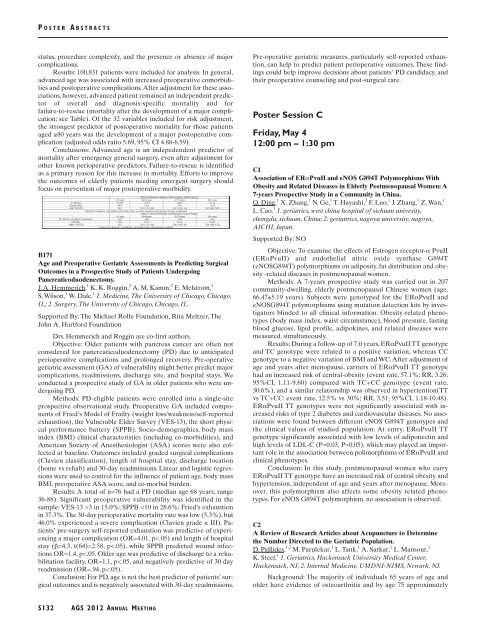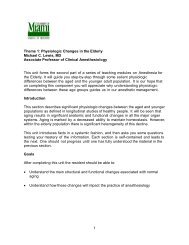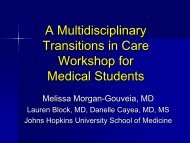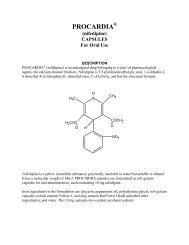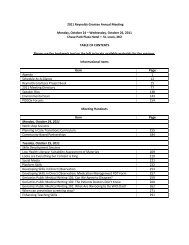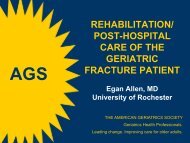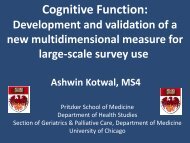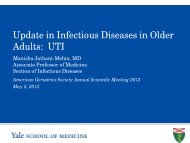Here - American Geriatrics Society
Here - American Geriatrics Society
Here - American Geriatrics Society
You also want an ePaper? Increase the reach of your titles
YUMPU automatically turns print PDFs into web optimized ePapers that Google loves.
P OSTER<br />
A BSTRACTS<br />
status, procedure complexity, and the presence or absence of major<br />
complications.<br />
Results: 100,831 patients were included for analysis. In general,<br />
advanced age was associated with increased preoperative comorbidities<br />
and postoperative complications. After adjustment for these associations,<br />
however, advanced patient remained an independent predictor<br />
of overall and diagnosis-specific mortality and for<br />
failure-to-rescue (mortality after the development of a major complication;<br />
see Table). Of the 32 variables included for risk adjustment,<br />
the strongest predictor of postoperative mortality for those patients<br />
aged ≥80 years was the development of a major postoperative complication<br />
(adjusted odds ratio 5.69, 95% CI 4.88-6.59).<br />
Conclusions: Advanced age is an indepedendent predictor of<br />
mortality after emergency general surgery, even after adjustment for<br />
other known perioperative predictors. Failure-to-rescue is identified<br />
as a primary reason for this increase in mortality. Efforts to improve<br />
the outcomes of elderly patients needing emergent surgery should<br />
focus on prevention of major postoperative morbidity.<br />
B171<br />
Age and Preoperative Geriatric Assessments in Predicting Surgical<br />
Outcomes in a Prospective Study of Patients Undergoing<br />
Pancreaticoduodenectomy.<br />
J. A. Hemmerich, 1 K. K. Roggin, 2 A. M. Kamm, 2 E. Melstrom, 1<br />
S. Wilson, 1 W. Dale. 1 1. Medicine, The University of Chicago, Chicago,<br />
IL; 2. Surgery, The University of Chicago, Chicago, IL.<br />
Supported By: The Michael Rolfe Foundation, Rita Meltzer, The<br />
John A. Hartford Foundation<br />
Drs. Hemmerich and Roggin are co-first authors.<br />
Objective: Older patients with pancreas cancer are often not<br />
considered for pancreaticoduodenectomy (PD) due to anticipated<br />
perioperative complications and prolonged recovery. Pre-operative<br />
geriatric assessment (GA) of vulnerability might better predict major<br />
complications, readmissions, discharge site, and hospital stays. We<br />
conducted a prospective study of GA in older patients who were undergoing<br />
PD.<br />
Methods: PD-eligible patients were enrolled into a single-site<br />
prospective observational study. Preoperative GA included components<br />
of Fried’s Model of Frailty (weight loss/weakness/self-reported<br />
exhaustion), the Vulnerable Elder Survey (VES-13), the short physical<br />
performance battery (SPPB). Socio-demographics, body mass<br />
index (BMI) clinical characteristics (including co-morbidities), and<br />
<strong>American</strong> <strong>Society</strong> of Anesthesiologist (ASA) scores were also collected<br />
at baseline. Outcomes included graded surgical complications<br />
(Clavien classification), length of hospital stay, discharge location<br />
(home vs rehab) and 30-day readmissions. Linear and logistic regressions<br />
were used to control for the influence of patient age, body mass<br />
BMI, preoperative ASA score, and co-morbid burden.<br />
Results: A total of n=76 had a PD (median age 68 years; range<br />
36-88). Significant preoperative vulnerability was identified in the<br />
sample: VES-13 >3 in 15.0%; SPPB


